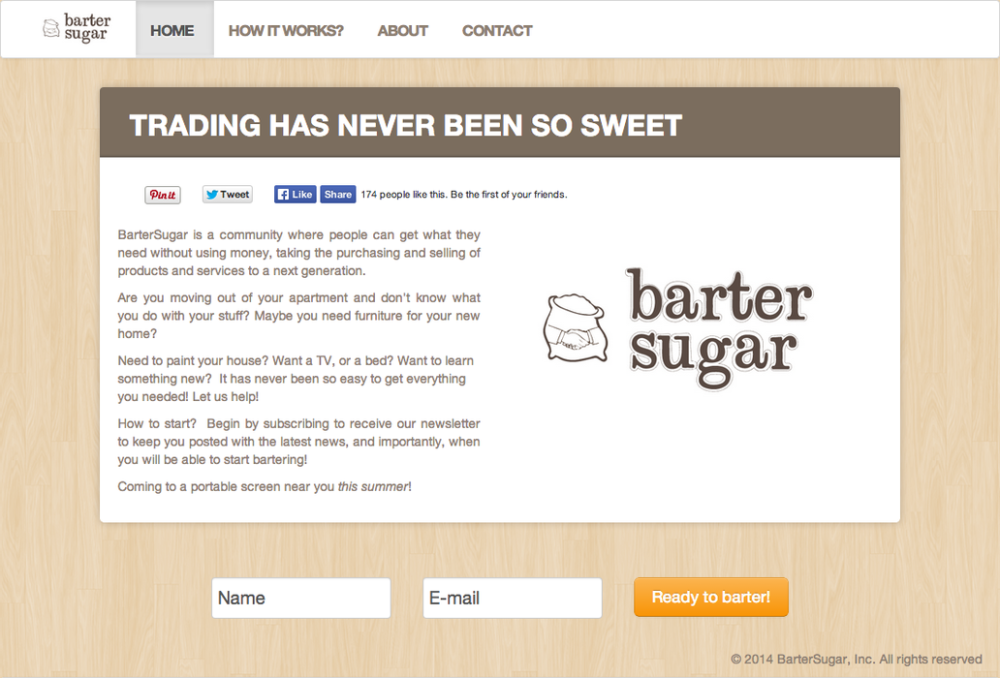By David Falchek
The Times-Tribune, Scranton, Pa.
When Layla Tabatabaie worked at a Scranton bakery as a University of Scranton undergrad, she and other employees were allowed to take leftover bread home, often more than they could or their roommates could eat.
So Ms. Tabatabaie, as cash poor as any student, bartered the bread — for help with a lesson, her contribution to a party, a cup of coffee, or a fresh cooked meal.
Later, attending school in New York City and working as an attorney, she found young cash-strapped community of barterers taking advantage of what is called the sharing economy.
She even bartered legal advice and services.
With help from a venture capital group, the Dunmore native turned something natural to her and her cohorts into a business and website, BarterSugar.com, which she hopes will expand the bartering community and make it easier for people to get what they want without using money.
“This has always been a natural thing for me but I never thought of it as a business,” she said.
In law school, she’d often declare that she would never start a business. But when the idea of an “eBay of bartering” struck her, it wouldn’t let go.
She recognized that even in a big city such as New York, barterers are limited by their social circle. They don’t have access to barter for certain things they may want and need. Barter Sugar creates a platform to allow bartering among strangers, even across distances.
She got the name for her business from the age-old practice of asking a neighbor for cup of sugar.
How it works
The interface is similar to E-bay: people post items and services they are willing to barter. Unlike E-bay there is no auction or countdown.
Let’s say someone is willing to barter a few X-Box games and posts them under his BarterSugar account.
Some looking to add to their video game collection without spending money finds the posting and expresses an interest.
The seller looks at what the buyer is offering, and notices the person drives to Boston one weekend a month and is willing to take someone along as a bartered service.
The video game owner has no vehicle but does have friends and Boston. A barter is reached.
Someone may barter a coffee table for a massage or help someone move for an afternoon in exchange for help designing a website.
After a good trade, people leave feedback, enhancing the reputation of barterers or weeding out the unreliable.
Bartering can change the way people think about acquiring goods and services, Ms. Tabatabaie said. Also, it can help them unlock value in their skills and ability.
“The only alternatives people have is to wait for their paycheck, put off getting what they want until they get the money or go into debt,” she said. “Bartering is an alternative to that way of looking at life. Bartering empowers people to use the skills or stuff they already have, rather than how much money they have, to get what they want.”
She’s targeting groups who have skills or excess stuff, and not much money. One group is college students and recent graduates. Two thirds of college graduates carry debt, and the majority don’t immediately find jobs in their field, leaving a large population with skills but without a clear way to monetize them.
Some student users of the site offer class notes or tutoring. She’s working on arrangements with some colleges and universities endorse BarterSugar.
Another group is parents with piles of stuff for fast-growing children — from clothes and carriers to toys — quickly outgrown and gently used.
Parents have a surplus of stuff, yet cash is tight. Then there are entrepreneurs, artists and musicians looking to use their skills.
Bartering things such a furniture for flatware requires a critical mass of users in a particular area. But many barters involve services such as résumé review, photo editing or graphic design, that can be done over distances.
Ms. Tabatabaie quit her job as an intellectual property attorney and moved to Memphis, where the venture capital firm Wolf River Angels is located.
Barter Sugar co-founder, software programer Andres Arsalanian, is completing a master’s degree in Boston. Other than that, Barter Sugar is just her and a team of interns.
Adam J. Ceresko, founder of Scranton-based Appek Apps, took a look at Barter Sugar and found it interesting and possibly useful for a lot of people. But that doesn’t always translate into success online.
“You just never know because you see things that look like pure genius that flop while stuff that seems stupid takes off,” he said. Appek Apps’ biggest hit is French Girls, an app which allows strangers to draw portraits of each other based on selfies.
As web and app development gets easier and draws more people into the game, Mr. Ceresko said BarterSugar would need two things: distribution and discoverability for its success.
“There are so many great products out there that we don’t know about because of the marketing strategy,” he said.
A short video demo of Barter Sugar shows someone offering to help someone move in exchange for an accordion lesson.
The range of possibilities is endless.
“I’d like to see someone offering to teach magic tricks, or lessons on how to make balloon animals,” Ms. Tabatabaie said. “I always wondered about that.”














































































































































































































































































































































































